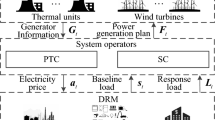Abstract
Many power trading system models have been proposed, but many of them do not aim at load reduction by making customers cooperate with power suppliers in a power trading market. Some researchers have tried to solve the problem by introducing rewards in the power market. This approach was developed on an evaluation function of satisfaction, but there was a problem in that it could be applied only to customers whose evaluation functions could be estimated beforehand. Therefore, this article proposes a new cooperative power trading system that can cope with various kinds of customer by modeling a power market on a satisfaction space. Satisfaction space technology can deal with customers without the evaluation functions.
Similar content being viewed by others
References
Soft S (2002) Power system economics: designing markets for electricity. Wiley, New York
Dy-Liacco TE (2002) Control centers are here to stay. IEEE Comput Appl Power 15:18–23
Vaahedi E, Shahidehpour M (2004) Decision support tools in restructured electricity systems: an overview. IEEE Trans Power Syst 19:1999–2005
Guerci E, Ivaldi S, Raberto M, et al (2007) Learning oligopolistic competition in electricity auction. Comput Intell 23:197–220
Matsumoto K, Mori N, Kitayama M, et al (2001) An interactive demand side management system using utility functions. Proceedings of the International Conference on Intelligent System Application to Power Systems (ISAP 2001), Budapest, Hungary, June 2001, pp 197–201, DYNAdata, Budapest
Karlsson M, Ygge F, Andersson A (2007) Market-based approaches to optimization. Comput Intell 23:92–109
Vojdani AF (2003) Tools for real-time business integration and collaboration. IEEE Trans Power Syst 18:555–562
Author information
Authors and Affiliations
Corresponding author
About this article
Cite this article
Maruo, T., Matsumoto, K. & Mori, N. Development of a cooperative power trading system using satisfaction space technology. Artif Life Robotics 14, 7–11 (2009). https://doi.org/10.1007/s10015-008-0709-z
Received:
Accepted:
Published:
Issue Date:
DOI: https://doi.org/10.1007/s10015-008-0709-z




